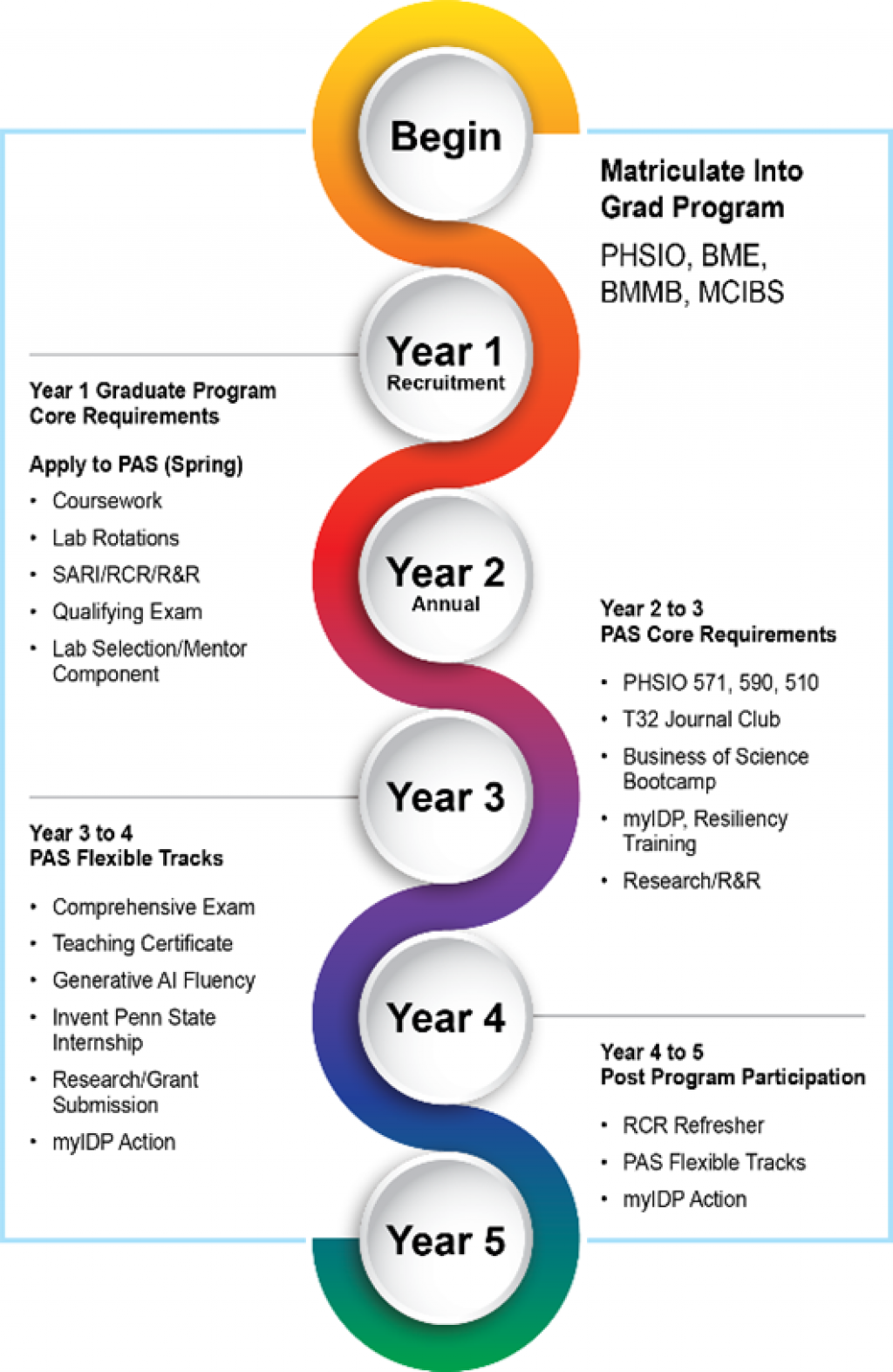
Courses and credits required for completion of the Physiological Adaptations to Stress Training Program

Required Coursework
- PHSIO 510 (Physiological Adaptations to Stress; Capstone/Core Course; 3 credits)
- PHSIO 571 (Integrative and Cellular Mammalian Physiology I; 3 credits) or equivalent
- PHSIO 590 (Science Communication; 1 credit)
- BA 802 (Team Process and Performance; 1 credit)
- Statistics (minimum 3 credits at the 500 level; STAT 501 and 502 recommended)
- Business of Science Boot Camp (1 week; early summer of each year)
Required Program Activities
- Training Program Journal Club (alternating years)
- Semester Student Meetings (also used for Responsible Conduct of Research, Diversity and Disability refresher events)
- Yearly Individual Development Plan (IDP) development and participation until graduation
- Resiliency Training (NIH BRS curriculum)
- Annual Program Retreat and Review
- One Health Microbiome Center Seminar Series (attend 3)
Optional Coursework and Experiences
- BGEN/MCIBS/BMMB 551 (Genomics; 3 credits)
- KINES 590B (Exercise Physiology Colloquium/Noll Seminar; 1 credit)
- NUTR 508 (Critical Readings in Molecular Nutrition; 1.5 credits)
- MBIOM 550 (One Health Microbiome Center Seminar; 1 credit)
- Office of Technologies Management Summer Fellows Program
Optional Interest Tracks
Optional Track 1: Graduate Teaching Experience in Biology and CIRTL Certificate
The Penn State Graduate School offers a Teaching Certificate to provide graduate students with an avenue to enhance their teaching skills, in partnership with The Center for the Integration of Research, Teaching and Learning (CIRTL). CIRTL seeks to enhance excellence in STEM undergraduate education through advancing evidence-based teaching practices for diverse learners. Students may register for either SC 220 (1 credit, meets once per week, 75 minutes, for 7 weeks) or BIOL 893 (2 credits - meets once per week, 75 minutes, for 15 weeks). Grad students also earn BIOL 602 credit while they are teaching, which is also required for the grad teaching certificate. Students develop a website that includes a statement of teaching philosophy and demonstration of the ability to develop a PowerPoint presentation.
Optional Track 2: AI Challenges & Opportunities
Students will complete a course in AI ethics. For example, Artificial Intelligence Ethics (A-I 804) or Genetics Law (ENGR 497-002) or Datafied Cultures and Privacy Law (ENGR 497-001). The Ethics of AI seeks to study the far-reaching and diverse ethical issues that arise with the widespread and rapid integration of AI technologies into various aspects of our lives, including STEM teaching and research.
Optional Track 3: Invent Penn State Internship/ICOR Short Course
Students motivated by the Business of Science Bootcamp may complete the I-Corps Virtual Regional Short Course hosted by Penn State. The goal of I-Corps is to reduce risk associated with translating technologies from the laboratory to the marketplace. Completion of the short course affords students the opportunity to participate in the NSF I-Corps Hub and compete for $50K in funding. Teams that participate in the NSF-I-Corps training are three times more likely to receive SBIR/SSTR funding than those who don’t. This is an extraordinary opportunity for those students oriented towards discovery and biotechnology.